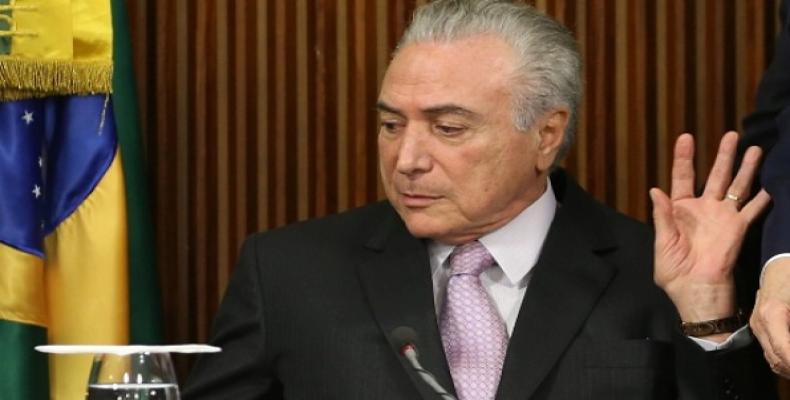Brasilia, December 12 (RHC)-- Brazil's unelected President Michel Temer has proposed a dramatic attack on the country's pension system that would force Brazilians to work for longer before being eligible for full retirement benefits, while simultaneously keeping tax breaks for agricultural commodity exports.
Temer's plan would reduce benefits, raise social security contributions by civil servants and set a minimum age of retirement at 65 years in a country where people work on average until the age of 54 years before retiring.
"We urgently need to make changes to preserve the pension system," Temer said during in a meeting with congressional leaders in Brasilia. "We have to put back the date of retirement and that can only be done by establishing a minimum age." According to Brazil's Globo News, military officials will be exempt from the proposed pension reform.
The government, however, will not scrap an exemption from taxes on agricultural commodity exports that could raise revenues by more than US$1.45 billion per year, a senior government official said, denying media reports the government would end the tax break to raise income.
By attacking pensions but keeping tax breaks in place, Temer is attempting to place the burden of the worst recession on record on the shoulders of working Brazilians.
Cuts to social programs and benefits have been at the heart of the Temer administration's austerity drive. The Brazilian Senate is set to soon hold a final vote on a constitutional amendment that would freeze social expenditures for the next 20 years.
The pension reform, which Temer has promised since he was installed in president in May through the highly-questioned impeachment process that removed former President Dilma Rousseff from office, faces fierce opposition from powerful labor and civil servant unions that threaten to organize street demonstrations to block the changes.
Despite such threats, the government will send the reform plan to Congress where it is expected to spark a heated debate that could last several months. Expenditures from social security make up about 40 percent of the Brazilian government's primary spending, or spending before debt payments.
Social security expenditures have risen to an estimated 2.7 percent of gross domestic product in 2017 from 0.3 percent in 1997, according to government estimates. Government officials have tried to suggest that this spending constitutes the main threat to the country's finances in the future. Temer argued the cuts were necessary to ensure the system does not collapse because of lack of funding.
Brazilian President Michel Temer Pushes Unpopular Pension Cuts

Articles en relation
Commentaires
Laissez un commentaire
Tous les champs sont requisPlus de visites
- Le président cubain Miguel Díaz-Canel a félicité aujourd'hui la danseuse étoile et directrice générale du Ballet National (BNC), Viengsay Valdés.
- Des centaines de militants étrangers accompagnent Cuba le 1er mai
- Équateur : Luisa Gonzalez réitère sa dénonciation des irrégularités électorales
- Panama : Le président Mulino souligne que son pays ne cèdera pas aux pressions étrangères
- Cuba respire déjà le 1er mai

